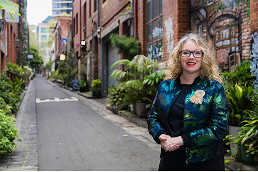QVM powers up with solar panels as city gears towards net-zero
The Queen Victoria Market (QVM) has taken a significant step in its sustainability goals with new solar panels expected to cut its power bill by $100,000 a year.
The project – set to be completed in mid-2023 – will see more than 1500 solar panels installed on the market’s huge rooftop, covering an area equivalent to three Olympic swimming pools.
The City of Melbourne announced in August it had powered up 650 new solar panels with another 900 to be installed in the coming months in a move that will not only save electricity costs but reduce the landmark’s carbon emissions by 1300 tonnes each year.
City of Melbourne Lord Mayor Sally Capp said the “major investment” would play a significant role in the council becoming a zero-carbon city by 2040.
“We’re doing everything we can to reduce our environmental impact and build resilience to ensure Melbourne is one of the world’s most sustainable cities,” she said.
“We’re championing sustainability through our renewal program by incorporating solar power, stormwater harvesting and on-site organic waste recycling – making it easier for traders to run their businesses, while reducing the market precinct’s environmental footprint.”
“The market’s new solar power system will cut costs and carbon emissions, providing flow-on benefits for traders, the environment and the City of Melbourne.”
QVM CEO Stan Liacos said the market was proud of its long-term pledge to renewable energy including a recent focus on waste management.
“Solar panels were first introduced at the market in 2003 when 1328 photovoltaic panels were installed with support of the City of Melbourne – it was the largest of its type in the Southern Hemisphere at that time,”
he said.
“The installation of this new solar system, along with other sustainability initiatives such as recycling 80 per cent of the market’s waste, up from 50 per cent three years ago, means we are on target to achieve our mission of zero net carbon emissions by 2027.”
By harvesting sunlight, the solar panels will generate a total of more than 900,000 kilowatt hours a year – enough to power 205 Melbourne households.
The council’s environment portfolio lead councillor Rohan Leppert said its infrastructure priorities were in response to the world’s climate emergency. •

A milestone for the mysterious





 Download the Latest Edition
Download the Latest Edition